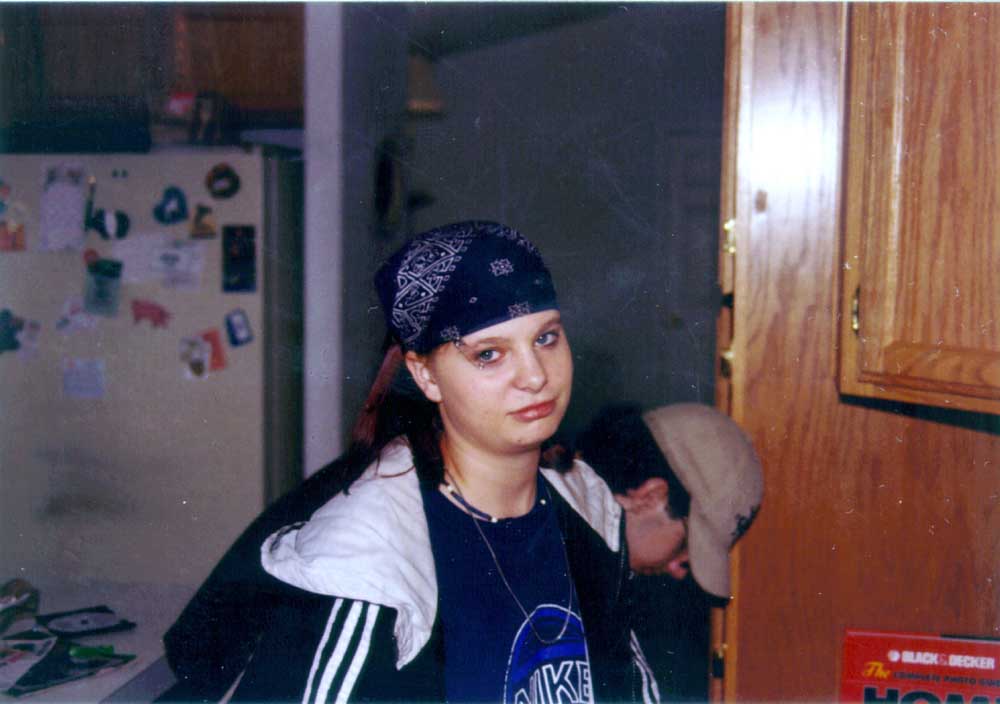After decades in prison for a crime committed when they were teenagers, parole board grants release to four Redmond 5 killers
Published 8:00 am Tuesday, May 16, 2023

- Ashley Summers, then 15, stands in Barbara Thomas' kitchen on the day of the murder. Adam Thomas is in the background. The teens shot photos of themselves that day with a camera they left at the crime scene. Investigators then developed the film.
When Ashley Summers appeared before the Oregon Board of Parole earlier this month, she had spent more than two decades in prison for a crime she committed when she was 15.
Her conviction came with a brand she could never remove: She would always be known for her role in the murder of Barbara Thomas on March 26, 2001. She would always be one of the five teens who committed one of Central Oregon’s most grisly murders — the Redmond 5.
Summers was sentenced to 25 years without parole, but now at 37, she told the board she had changed, that she deserved early release.
“Not a day goes by that I don’t think of the pain and suffering Mrs. Thomas went through and that her murder caused,” she said. “I have a lot of guilt and shame that I wasn’t strong enough to stand up and do what was right.”
The parole board approved Summers’ request on May 5, saying she had “demonstrated maturity and rehabilitation” since the crime. She’s the fourth member of the Redmond 5 to be granted release. Each will reenter a society far different from the one they knew as teenagers — one that is not certain to accept them.
Lucretia Karle, who was sentenced to 25 years without the possibility of parole for conspiracy to commit murder, was released on Sept. 30, 2021. Justin Link and Seth Koch, who were each convicted of aggravated murder and sentenced to life without parole, were each granted release in recent months. Link was scheduled for release on April 29 and Koch is June 19. Summers is scheduled for release on June 30.
Only one member of the Redmond 5 — Adam Thomas, Barbara Thomas’ son — is not yet eligible for parole. He was an adult when he committed the crime. He can apply for release in 2026, attorneys say.
Advocates for juvenile justice reform and attorneys have praised the board’s decisions, arguing that people who made grave mistakes as teenagers have the potential to rehabilitate.
“To me, they exemplify the capacity that juvenile offenders have for change,” Jessie Schuh, Summers’ attorney, said of the Redmond 5. “I just think that locking up kids and throwing away the key is not the right thing to do.”
Critics of the decision voiced concerns, though.
“If somebody has demonstrated the capacity to commit the most heinous crimes imaginable, it is a concern that they may commit other crimes at a later point,” said Deschutes County District Attorney Steve Gunnels, who responded to the crime scene 22 years ago. His office argued the group should serve out their sentence, adding that some have not fully acknowledged their role in the murder.
But Gunnels added: “If somebody’s gone through the legal process to be paroled or released, the people around them should give them a chance to demonstrate that they’ve been rehabilitated.”
A former Girl Scout and basketball player with a distant mother who struggled with heroin addiction, Summers had described feeling like an outcast as a child, a memorandum to the state parole board said. She was “driven by a constant need to try to win her mom’s love and attention, and then felt empty, aimless, and alone when those efforts were unsuccessful,” the memo said. She started drinking, smoking, cutting classes and hanging out with older kids in middle school.
“Aside from these relatively minor behavioral issues, Ashley was a fairly ordinary adolescent,” the memo says.
Eventually she met the Redmond 5 teens. They planned to steal Thomas’ car, head to Canada and get into the marijuana business. As the situation spiraled, they beat Thomas, 52, with empty wine bottles and fatally shot her with a hunting rifle.
When Summers was sentenced, she hadn’t yet learned to drive, written a check or paid a bill, Schuh said.
Where the Redmond 5 members released will go now remains unclear.
Seth Koch, who shot Thomas, told the parole board he doesn’t want to return to Deschutes County, hoping to avoid running into the Thomas family and causing further trauma.
Schuh declined to say where Summers will go, but Summers told the board she plans to move home and live with her family, possibly working in a hair salon.
Some expressed interest in working with at-risk youth, sharing their stories to deter others from crime. Each said they aim to stay out of trouble.
The Redmond 5 became eligible for parole amid a shifting state and national legal landscape that has made it easier for juvenile offenders to seek release from prison.
The changes were largely precipitated by a 2012 U.S. Supreme Court ruling. It made a life sentence without the possibility of parole for juveniles convicted of aggravated murder unconstitutional under the Eighth Amendment, which forbids cruel and unusual punishment.
Oregon’s law changed in 2019, when lawmakers passed Senate Bill 1008. The bill sought to end the state’s practice of automatically sending youths accused of serious crimes to adult court. Then, in 2021, Oregon Gov. Kate Brown issued a mass commutation order that allowed many inmates convicted as juveniles — including four of the Redmond 5 — to seek parole or release.
The board doesn’t grant release to just anyone, attorneys said. In a lengthy series of evaluations and hearings, the inmates were required to explain how they had come to understand why they had committed the crime. They spoke candidly to board members about the trauma their actions caused the Thomas family and community and their efforts to repent.
They also sought to illustrate their progress and spoke about their plans for being productive members of society. Three of the inmates were never disciplined in prison. They took a variety of programs, jobs and counseling. Koch mentored youth offenders, taught some how to read and sanitized prison cells of sick inmates. Summers worked as a dog trainer, a hospice worker, and a call taker.
“These are people that you’d be lucky to have as a neighbor,” said Jody Davis, attorney for Justin Link. “They genuinely are just good people despite committing this awful crime.”
Members of the Thomas family declined to comment for this story.
Psychological evaluations showed Koch, Link and Summers are considered low risk of future violence. Attorneys for these three argue juvenile offenders seldom recidivate.
A 2021 report from The Sentencing Project, a Washington D.C.-based research group that advocates for improvements to the criminal justice system, said: “In most studies of recidivism rates of persons convicted of murder or other violence, recidivism rates are less than 10%, often as low as 1-3%.”
Schuh, Summers’ attorney, said the outcomes for the Redmond 5 underscores a growing body of research indicating youth offenders do not fully understand the consequences of their actions and are prone to acting impulsively because their brains are not fully developed.
Attorneys attributed the decision to murder Thomas, in part, as the product of groupthink, with a group of impressionable youths — some with troubled childhoods — who didn’t think through their actions or see another way out.
“If one of them had spoken up, I think they all would have walked away,” Schuh said.
Attorneys voiced confidence in their clients’ potential to reintegrate into society, despite the fact that some of them spent the formative years of their lives incarcerated. They acknowledged that some people might not accept them.
“I can see why people would not,” said Link’s attorney, Davis. “But on the other hand, for the most part, I have full faith that people will serve this community and will be ambassadors for what rehabilitation will look like.”





